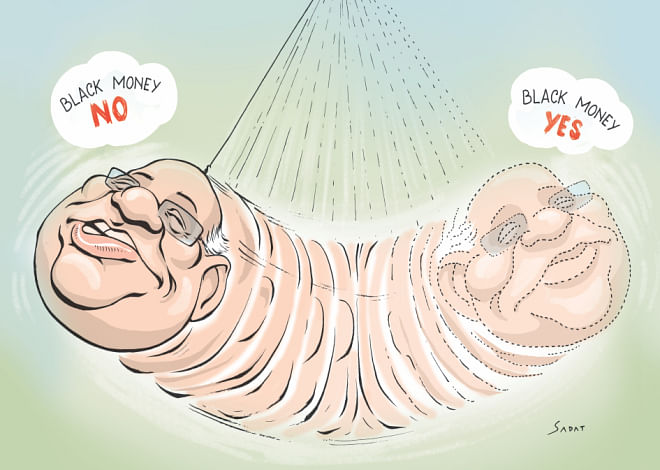Muhith trashes media reports
Muhith trashes media reports

Finance Minister AMA Muhith yesterday said media reports on continuation of the scope for whitening black money through investment in real estate were “utter nonsense”.
"Yes, and I have stuck to my guns. It is rubbish that you have printed … totally rubbish … I have not given anything," said a peeved Muhith in response to queries on the scope for legalising black money in real estate.
The minister said there was no black money and no scope for whitening black money in the country. It was not him but the income tax law that provides the privilege on condition that one pays the fine.
He was talking to reporters at his office at the Economic Relations Division.
A number of analysts, however, find Muhith's comment confusing in the light of the related provision of the law that provides scope for legalising investments in purchase of flats without any question.
The finance minister's remark came two days after parliament passed the Finance Act 2014, repealing a provision that allowed unquestioned investments of black money in treasury bonds on payment of 10 percent tax on the invested money.
The Act came into effect yesterday.
"Only one law was there which permitted black money … that I have cancelled,” he said, adding that in case of the other two (investments in real estate and a 10 percent penalty on top of normal tax), fines are levied.
Speaking in parliament on June 28, the minister said, "These two provisions can be extended as they are necessary to ensure balance in the tax payment system. It can be mentioned that money obtained through terrorism and corruption cannot be shown to get the privilege."
He said the provision for unquestioned acceptance of investments in flats by paying a certain amount of tax is part of efforts to simplify the tax payment system.
In fiscal 2013-14, the government included a provision in the Income Tax Ordinance that provides scope for money holders to clear investments in purchase of flats without showing the source of the money.
They have to pay a certain amount of tax depending on locations, according to a circular of the National Board of Revenue.
The provision says, "Notwithstanding anything contained in this Ordinance, source of any sum invested by any person, in the construction or purchase of any residential building apartment, shall be deemed to have been explained if the assessee (taxpayers) pays, before the assessment for the relevant assessment year in which the investment is completed, tax at the following rate …"
Analysts have questioned the efficacy of such a provision as taxmen will not raise any question about the invested money after getting a specific amount of tax against the construction or purchase of residential buildings and flats.
This means it will not be possible for taxmen to know whether or not the invested money has been earned through illegal means.
Asked about the provision, Muhith yesterday said taxmen might not question the source of the money.
"It does not prohibit the income tax department from asking questions ... It is totally, utterly … utterly useless question from the press," he said.
The minister, however, said the privilege given in the real estate sector didn't attract much investment.
Asked whether he still stuck to his stance that no scope was given for a whitening of black money, Muhith said, "Of course … Of course. There is no concession for black money."
Mirza Azizul Islam, former adviser to a caretaker government, termed Muhith's statement “confusing”.
"I have nothing to say," he said.
Things would be clear if Muhith's statement was matched against the relevant provision, said the former adviser.
"The provision that no question will be raised [about the source of money] is immoral and unethical," he said.
Zaid Bakht, research director at Bangladesh Institute of Development Studies, said if no question is raised about the source of the money, it means that scope has been given to whiten black money.
"It does not seem to be a proper interpretation [from Muhith]," he said.
Dr Iftekharuzzaman, executive director of Transparency International Bangladesh, demanded a clarification from Muhith.
"We want to believe what he said. But we will be happy to get an explanation on the provision for investments in the real estate sector, and whether the provision is contradictory or not and whether it will continue.
"Otherwise, we will assume that the government has created an arrangement, through which the real estate sector will go to the hands of people earning money illegally," he said.